This is the second article that explores in depth how IFF’s continuum of services are deployed to strengthen Midwest communities. Click here for the first article, which focuses on the North Lawndale neighborhood in Chicago.
In a Nutshell
What: An overview of IFF’s work in the 49507 ZIP code, a collection of neighborhoods in southeast Grand Rapids where the full spectrum of IFF’s toolkit has been deployed to support residents and other community stakeholders in their work to improve the quality of life in the community.
Location: Grand Rapids, MI
Impact: Since closing our first loan in the 49507 ZIP code in 2015, IFF has facilitated the development of critical community infrastructure that is increasing access to quality affordable housing, education, and other vital services needed to revitalize southeast Grand Rapids.
As IFF CEO Joe Neri has outlined previously, capital is an essential element of successful community development efforts, but simply making it available to community changemakers is insufficient to mitigate and solve local economic, health, education, environmental, and social challenges. Accomplishing that requires a willingness to meet local stakeholders where they are, build relationships to understand what resources and support are most needed, and to deploy a set of tools tailored to local needs that work in tandem to create stronger, more vibrant communities.
To illustrate what that looks like at IFF, we’re shining a light on the collection of neighborhoods southeast of downtown Grand Rapids, MI, in the 49507 ZIP code.
Spotlight on Grand Rapids’ 49507 ZIP Code
Covering roughly 5.5 square miles, the 49507 ZIP code is home to more than 38,000 residents spread across several distinct neighborhoods within the city’s Third Ward. An extremely diverse and culturally rich area, southeast Grand Rapids is home to residents with aspirations like many Americans to attain sustainable, well-paying jobs; to live in quality, affordable homes; to provide their children with educational opportunities that lay a foundation for lifelong success; and to otherwise benefit from strong, vibrant communities. This is reflected in a tapestry of neighborhood organizations committed to realizing a future in which more residents have the chance to thrive.
Like many cities in the northern United States, Grand Rapids was a popular destination during the Great Migration as Black Americans pursued economic opportunity and lives free from the Jim Crow policies that defined their day-to-day experience in southern states. The city’s Black population grew precipitously over several decades as a result, with most new arrivals settling on the southeast side of the city because of informal discrimination and government-sanctioned redlining policies that prevented them from living elsewhere in Grand Rapids.
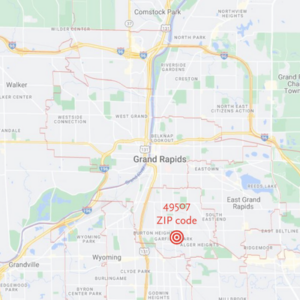
Following World War II, many of the remaining white residents in southeast Grand Rapids moved to the suburbs, catalyzing a cycle of disinvestment that had deep and long-lasting consequences. With a growing population in the suburbs, new highways were built to provide easy access to downtown, cleaving predominantly Black neighborhoods by creating literal barriers that displaced long-time residents and successful businesses. Today, Grand Rapids is routinely named one of the best places in the United States to live because of a strong job market, affordable cost of living, and high quality of life, but the ripple effect of deeply embedded structural racism continues to constrain opportunity in the 49507 ZIP code.
In recent years, the City of Grand Rapids has made a concerted effort to shift the paradigm in the 49507 ZIP code and the rest of the city’s Third Ward by investing in small businesses, enhancing public services, developing new community facilities, upgrading greenspaces, replacing hazardous lead water lines, doubling down on community-centered violence reduction strategies, and more. At the same time, nonprofits and community-based organizations have continued to propel these neighborhoods toward a more equitable future.
Since closing an initial loan in southeast Grand Rapids shortly after expanding to Michigan 10 years ago, IFF has become more deeply embedded in the community and is today working alongside public and private partners to accelerate the area’s revitalization in service to residents’ visions for their neighborhoods. Much of this work has been centered around affordable housing and education, both foundational elements of thriving communities and areas of need identified by Amplify GR, a nonprofit focused on the revitalization of southeast Grand Rapids that has worked extensively with local residents to determine community development priorities.
Though not inclusive of every way we’re doing so, the projects and activities in the sections below highlight how IFF is working in partnership with local stakeholders to strengthen neighborhoods in the 49507 ZIP code.
Supporting the Development of Community-Strengthening Facilities
While capital alone isn’t enough for successful community development, sometimes that’s all that’s needed for nonprofits to contribute to broader revitalization efforts. Such was the case in early 2015, when IFF provided its first loan in the 49507 ZIP code to LINC UP Nonprofit Housing Corporation (LINC UP). The loan refinanced debt held by the affordable housing developer for six duplexes and a seven-unit property in southeast Grand Rapids, enabling LINC UP to bring to a close a multi-year process to refinance the debt that began during the 2008 housing crisis.
Because of high foreclosure rates in the community during this period, coupled with dramatic drops in property values, traditional lenders were unwilling to refinance LINC UP’s original loan for the properties when balloon payments came due. In the years that followed, the nonprofit continued to work to refinance the debt, but the appraised value of the properties hindered LINC UP’s ability to secure the financing needed from several banks. With IFF’s loan, the organization was able to ensure that the properties in 49507 could continue to provide an affordable housing option to local residents.
Since this first touchpoint in southeast Grand Rapids, IFF has provided almost $24.6 million to community changemakers in the 49507 ZIP code, while also providing real estate support to two nonprofits in the area considering facilities projects. The positive impact of these investments on southeast Grand Rapids’ future is perhaps best exemplified by a 2020 loan that helped the Grand Rapids Center for Community Transformation (GRCCT) establish a permanent home in the Madison Square neighborhood.
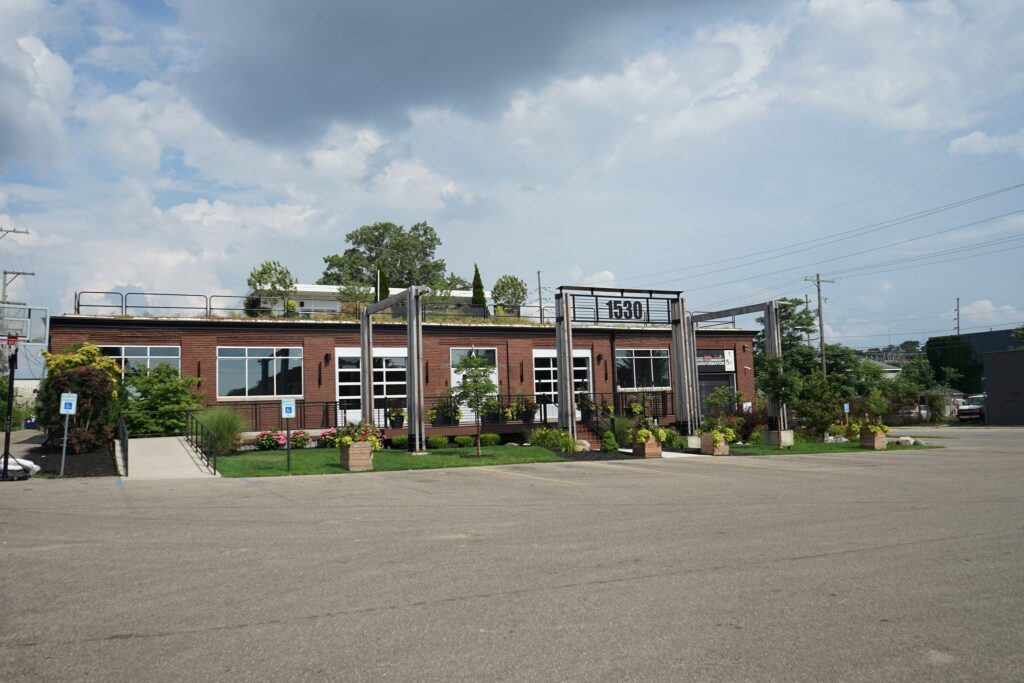
The exterior of the Grand Rapids Center for Community Transformation
Established in 2015, the GRCCT is a hub for social and economic impact that’s brought together nonprofits and social enterprises with distinct missions but a shared vision for a stronger, more equitable city. Housed in a 33,000-square-foot facility that was acquired, renovated, and furnished with the help of a $750,000 loan from IFF, the businesses and organizations share space, staff, resources, and learnings – all of which are being leveraged to create economic prosperity through community development, social innovation, and entrepreneurship.
“Purchasing and renovating the facility signaled to the community that we are here to stay…it’s also given us a sense of permanence and stability that was needed.”
“Many of our residents have been labeled high-risk, but more than anything they have been traumatized and then trapped by an unjust and inequitable system,” said Justin Beene, the founder and visionary of the GRCCT, in a 2022 interview. “The GRCCT helps all of us – residents, staff, investors, and volunteers alike – experience real hope and transformation through tangible avenues for education, employment, and community revitalization.”
Renovations to the once blighted building – which were completed in large part by local minority-owned contractors – included the addition of a 2,100-square-foot, LEED-certified commercial kitchen, community meeting rooms, a large event space that can hold up to 320 people, and other updates focused on increasing sustainability and accessibility.
“Purchasing and renovating the facility signaled to the community that we are here to stay,” said Beene. “It’s also given us a sense of permanence and stability that was needed. More tangibly, the new commercial kitchen and events space allows us to constantly have people in our building who then want to learn more about what we do and why we do it….and we love to share the story with them and how they can get involved in this movement.”
A Public-Private Partnership to Boost the Supply of Affordable Housing at Scale
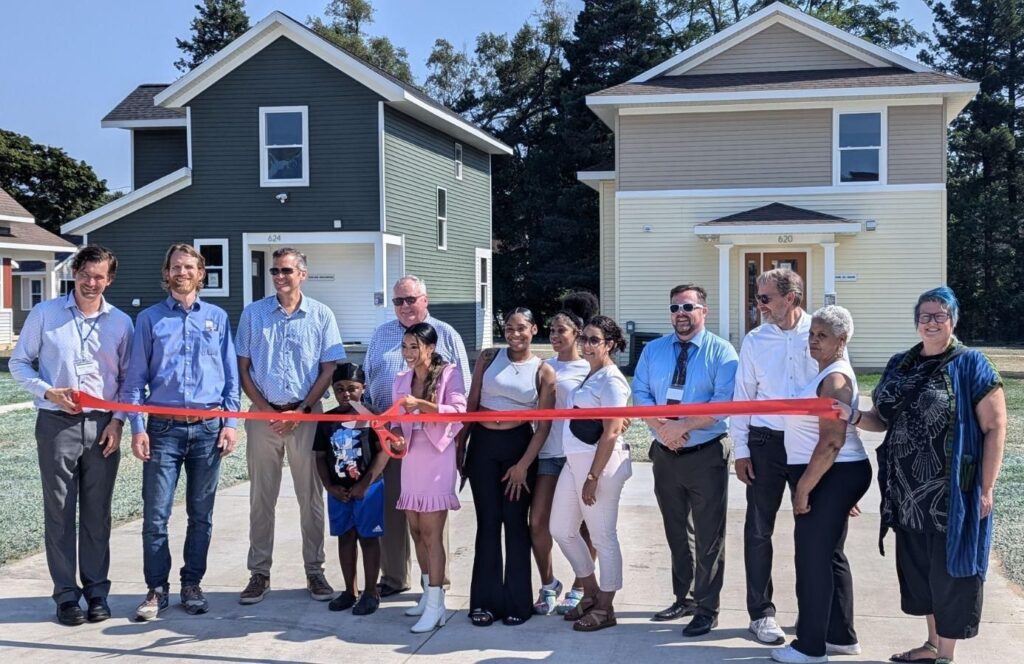
The ribbon cutting celebrating the completion of the first phase of Dwelling Place of Grand Rapids’ affordable housing project in the 49507 ZIP code facilitated by the Michigan Affordable Housing Loan Program
Building on our core offerings of flexible capital and real estate solutions to support nonprofits’ facilities projects, IFF partnered with Kent and Ottawa Counties in 2023 to launch the Michigan Affordable Housing Loan Program. Seeking to address a shortage of affordable housing units in West Michigan that is expected to reach 35,000 by 2027, MAHLP offers developers flexible financing tailored to their needs by utilizing $64 million in private capital raised by IFF from bank partners, foundation, and other sources; $17.5 million in American Rescue Plan Act (ARPA) funding from Kent County; and $10 million in ARPA funding from Ottawa County in a revolving loan fund.
We went out into the county and met with developers — big, small, for-profit, nonprofit developers — to understand what they really needed in these funds…it’s great to have a dedicated tool that can help bridge budget gaps to make more affordable housing projects happen.”
“We went out into the county and met with developers — big, small, for-profit, nonprofit developers — to understand what they really needed in these funds,” says Chris Uhl, IFF’s executive director for the Eastern Region. “A year since launching MAHLP, we’re doing quite a few loans for missing-middle funds, and it’s great to have a dedicated tool that can help bridge budget gaps to make more affordable housing projects happen.”
Designed to support a broad range of projects, MAHLP loans can be used for the development of rental housing and for-sale homes targeted to residents earning 80 percent or less of the Area Median Income (i.e., $71,600 in household income for a family of four) and 120 percent or less of the Area Median Income (i.e., $107,400 in household income for a family of four), respectively. This approach is meant to diversify the existing supply of affordable housing in West Michigan and ensure that residents are better able to access the housing option that is best suited for their needs. To date, four projects in the 49507 ZIP code have received financing through the MAHLP, helping to facilitate projects that might not otherwise have been feasible in southeast Grand Rapids.
This includes 42 single-family homes being developed in the Garfield Park neighborhood by Dwelling Place of Grand Rapids, 27 condos being developed by ICCF Community Homes in the Alger Heights neighborhood, 54 apartments for seniors in the Madison Square neighborhood being developed by LINC UP and MoTown Square Development, and 57 apartments in the Boston Square neighborhood being developed by Amplify GR and Brinshore Development.
“Affordable housing is something we’re very focused on at IFF, and partnering with Kent and Ottawa Counties through the MAHLP is making it possible for us to address the shortage of quality affordable housing in the 49507 ZIP Code and the broader region at scale,” says Uhl. “This kind of public-private partnership is an innovative solution to a pressing local challenge, and it’s a model that’s going to continue to generate positive outcomes over a long period of time.”
Increasing Access to Quality Early Childhood Education
Quality early childhood education (ECE) is a crucial component of strong communities, establishing a foundation for healthy growth and development among young learners that benefits families and their communities. For that reason, IFF has dedicated significant resources to increasing access to quality ECE in the 49507 ZIP code by deploying a broad range of tools in our continuum.
This work began in 2018 with an ECE needs assessment in Grand Rapids that found that only 16 percent of children aged birth to two had access to licensed and registered providers, with the city’s southeast communities identified as an area with a significant need for additional ECE slots. A subsequent 2020 analysis showed improvement in some communities, but significant need remained in key Grand Rapids neighborhoods – including those in the 49507 ZIP code.
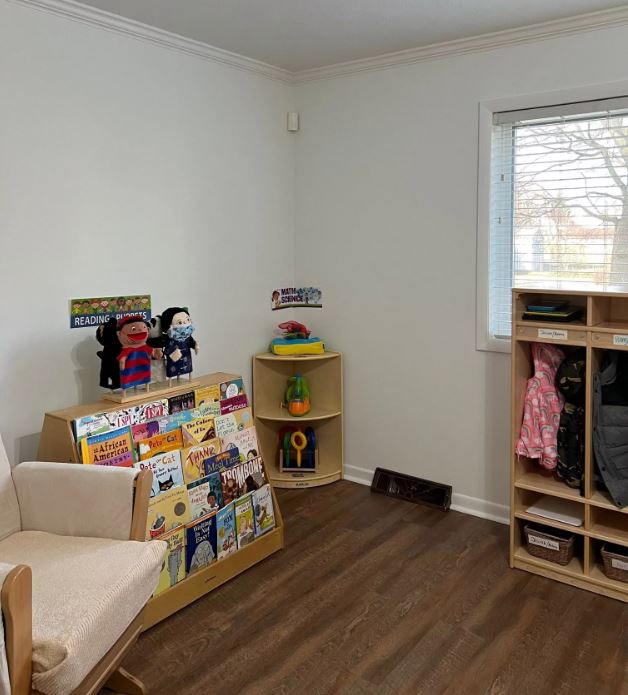
A renovated space at the Betty Dyson Child Care Group Home, one of the ECE providers supported through Learning Spaces Grand Rapids
In response, and with support from the W.K. Kellogg Foundation, IFF launched Learning Spaces in Grand Rapids, a program previously offered in Detroit designed to increase access to quality ECE by providing grant funding and technical assistance to local child care providers to transform their facilities into positive, safe, and inspiring learning environments. Leveraging CDFI Disability Funds, the program in Grand Rapids also layered in support to ensure learning environments were designed to be responsive to all children’s needs—including those with physical, intellectual, or developmental disabilities. Improving facilities enhances provider capacity, children’s access to care and education, and parents’ ability to work and provide for their families. Furthermore, it helps ensure that the design and quality of early childhood education facilities reflect the dignity all children and their families deserve.
Through Learning Spaces Grand Rapids, IFF helped 11 home-based ECE providers in the 49507 ZIP code upgrade their facilities by awarding nearly $449,000 in grants paired with support to navigate the construction process. Doing so helped to create 48 new ECE slots in southeast Grand Rapids, increasing access to quality early learning in the area. And while this is a step in the right direction, there’s still more work to be done. Last year, IFF published another ECE needs assessment focused on the Grand Rapids area, finding that significant need still exists in southeast Grand Rapids for additional ECE seats and that the cost of child care is a barrier for far too many families in the area.
While the report recommended a variety of near- and long-term strategies to build a more equitable ECE ecosystem, IFF is also taking a more proactive approach to further increase access to quality ECE in the 49507 ZIP code by developing a new, 9,000-square-foot ECE center in the Boston Square neighborhood. Part of the Boston Square Community Hub – a $25 million project led by Amplify GR that will also include a coffee shop, coworking space, event space, community classrooms, offices, and health clinic, surrounded by new mixed-income housing – the new ECE center will include 6-7 classrooms, a gross motor room, staff breakroom, warming kitchen, and outdoor play space.
In addition to creating 80 new ECE seats and further reducing the gap between the supply of and demand for quality child care, the new ECE center will serve as a teaching tool to help shape the ways in which providers, architects, engineers, designers, and others understand the relationship between facilities and programmatic quality and deepen the understanding of culturally competent and viable operating models. Toward that end, the design of the new ECE center reflects scalable practices on facility condition, green development, the comprehensive nature of programs, and financial and operational feasibility so that the model can be replicated in high-need communities across Michigan.
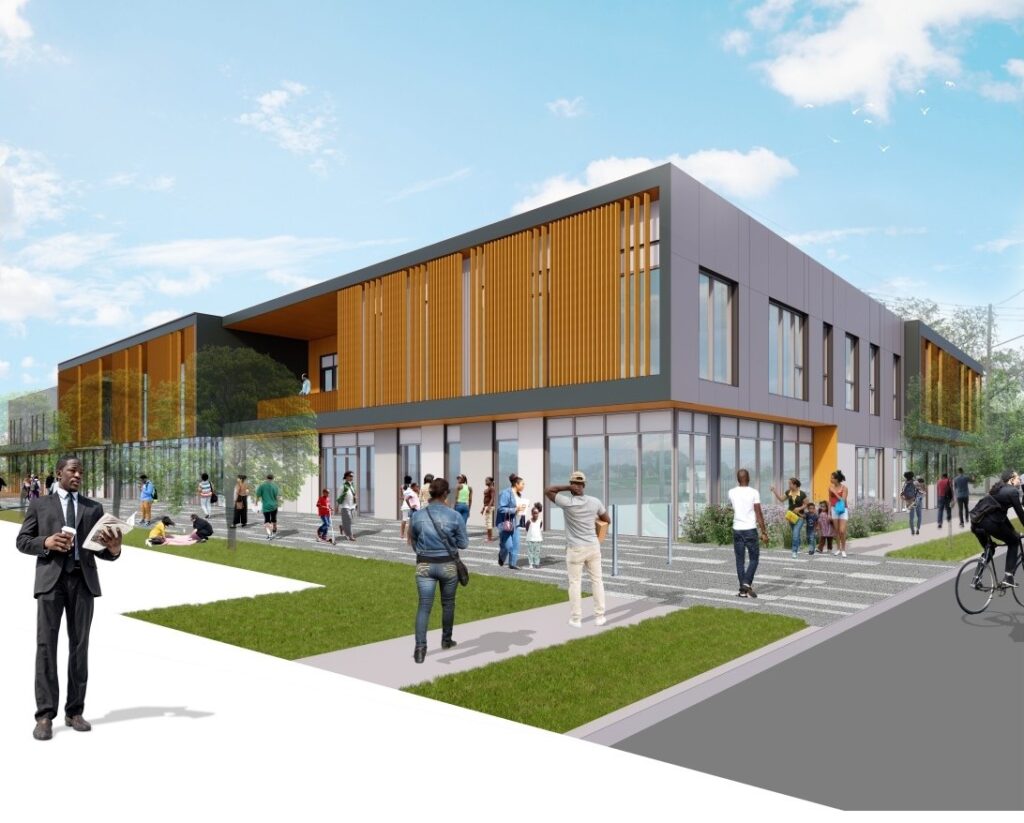
An architect’s rendering of the Boston Square Community Hub, which will include a 9,000-square-foot ECE center developed by IFF’s Community Development Solutions team
“IFF has planted roots in West Michigan, and southeast Grand Rapids specifically..now it’s all about layering our tools to better serve communities and accelerating our impact.”
Accelerating Impact in Southeast Grand Rapids
IFF’s growing role in Grand Rapids’ community development ecosystem, and the desire to continue to intentionally build our capacity to provide IFF’s full range of tools to the community, led us to open a new office in the 49507 ZIP code in the spring of 2022. Since then, new staff members with a deep understanding of local needs, challenges, and opportunities have joined the IFF team, enabling more holistic support for community stakeholders’ vision for southeast Grand Rapids.
“IFF has planted roots in West Michigan, and southeast Grand Rapids specifically, and there’s quite a bit of momentum to continue expanding our capacity,” says Uhl. “Now it’s all about layering our tools to better serve communities and accelerating our impact.”